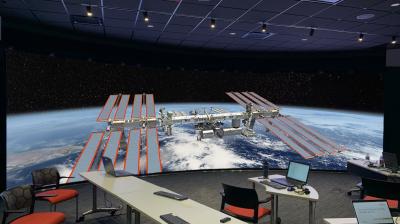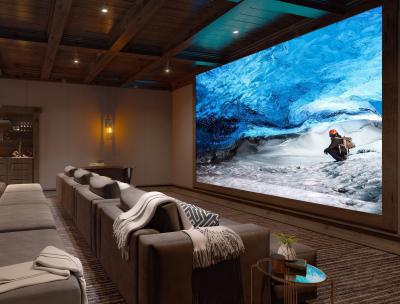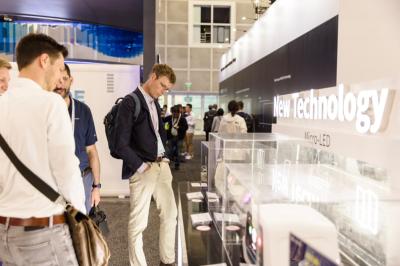![]() Sony, based in Japan, is a multinational consumer electronics company, a pioneer in the display industry for many years.
Sony, based in Japan, is a multinational consumer electronics company, a pioneer in the display industry for many years.
In 2012 Sony demonstrated the world's first micro-LED TV (55", Full-HD) which they termed Crystal-LED. Sony's 55" Crystal-LED never reached the market, but in 2016 the company unveiled its large-area outdoor micro-LED displays which Sony calls Canvas Display, or CLEDIS.
Over the years Sony released several generations of CLEDIS displays, and announced several large-area installations - see below for the latest news. In 2019 Sony started offering MicroLED Canvas displays for ultra-premium residential installations.
1-7-1 Konan
Minato-ku
Tokyo
108-0075
Japan
MicroLEDs Will Make a Macro Impact
This is a guest post, by Ioannis (John) Kymissis
Micro light-emitting diode (microLED) technology is the bright young thing in the display world, literally and figuratively. Its high luminance, sharp contrast, and vivid colors, among other attributes, make this one of the most dynamic emerging technologies for next-gen display applications. We’re just beginning to see what the future holds for microLEDs and their potential impact on display and imaging capabilities.
On the Technology Fast Track
MicroLEDs have made rapid advancements since they were first submitted for patent in 1998. The Kansas State University researchers who developed these miniaturized versions of LEDs envisioned using them in sensors, detectors, and mini-displays. But now, in just under three decades, many major display leaders and emerging companies are racing to produce and integrate the technology in everything from smartwatches to TVs to automotive displays.
North Carolina State University installs a 6 x 2.5 meters Sony microLED display at one of its libraries
North Carolina State University’s James B. Hunt Jr. Library installed a large curved Sony Crystal LED microLED display, to replace several video walls that were previously used.
The Sony microLED display was installed in a space known as the iPearl Immersion Theater. The display has a resolution of 4000 x 1620, and it’s approximately 6 x 2.5 meter in size. The display works as a digital exhibit space for student, faculty and community projects, so viewers will see student and faculty work, community project results, and special events information.
Sony launches a new microLED display solution for virtual production
Sony launches a new Crystal LED display, the VERONA, purpose-built to meet the needs of virtual production applications. Sony says that these new displays is tailored for filmmakers, bringing new levels of quality and efficiency to in-camera VFX applications.
For the VERONA, Sony developed new anti-reflection surface coating, which also enabled deeper blacks. Sony says that this innovative technology significantly reduces the difference in contrast between the image projected on the LED display and the actor(s) performing in front of it on set – blending virtual and real in a natural way, reducing time and cost required for post-shooting adjustments. VERONA displays also offer high brightness (1,500 nits), and a wide color gamut (97% DCI-P3). Most importantly the VERONA uses high performance LED drivers that support refresh rates up to 7,650Hz (!) to drastically reduce scanline artifacts on the camera.
Sony installs a curved 8K Crystal LED used for aerospace 3D simulations
A large US-government contractor in the aerospace sector installed a curved 8K 9.7 x 2.7 meters Sony Crystal LED display, used for internal and external design briefings. The display was installed on a custom frame and base, as close to the floor as possible, which creates a portal-like effect.

This large microLED tiled display was installed by Mechdyne, which provided the design, integration and virtual reality expertise.
Buying a microLED TV in 2021
Many believe that MicroLED technology will emerge as the next-generation display technology, and one of the first markets for such displays is the TV market. Several companies already offer microLED TVs - which you can already buy today. Assuming you have the money and a large enough room, that is.

As is often the case with new technologies, especially in the display industry, the first few years are marked with extremely high prices and limited selection. MicroLED TVs are no exception - as of 2021, they target the very high-end premium market, with very large TVs and prices starting at around $100,000.
But let's assume you really want to buy a microLED TV and can afford it. What are your options today?
Sony announces two new Crystal LED displays, the B-series and C-series with upgraded performance
Sony introduced its next-generation microLED display technology (direct-view LED as the company calls it), the high contrast Crystal LED C-series (ZRD-C12A/C15A) and the high brightness B-series (ZRD-B12A/B15A).
The new display modules offer two pixel pitch sizes (in both series), 1.26 mm and 1.56 mm and are equipped with Sony's "X1 for Crystal LED" image quality processor, which features Sony's signal processing technology and microLED control technology. Other features include high-quality and high-resolution upscaling, Sony's Motionflow technology for smooth and artifact-free pictures without motion blur, 22 bit Super Bit Mapping, 120 fps (HFR) and HDR.
Sony to soon unveil a new microLED display technology?
Sony published a teaser video that says the company will unveil the "next breakthrough" in directview display technology" on January 6th. It is likely that Sony will release a new MicroLED display technology:
Sony was the the first company to introduce micro-LED large-area displays with its launch of the Crystal LED (also called Canvas LED, or CLEDIS) displays in 2016. The company introduced its displays to the residential market in September 2020.
Sony brings its Crystal LED microLED displays to the residential market
Sony was the first company to introduce micro-LED large-area displays with its launch of the Crystal LED (also called Canvas LED, or CLEDIS) displays in 2016. Now Sony is introducing this groundbreaking display type to the residential market.

Crystal LED displays are made from tiled LED modules, each 403x453 mm in size and with a resolution of 320x360. The displays offer HDR support (peak luminance is 1,000 nits), 10-bit grayscale support, high frame rate (up to 120p) and a freedom of design.
Sony reveals its Cystal-LED MicroLED display prices in Europe
HDTVTest posted an interesting video showing Sony's 110" Crystal-LED micro-LED display at Sony's Basingstoke UK office, at a joint event organized with AWE, a Sony distributor in Europe. The reviewer is highly positive about Sony's Micro-LED display quality:
AWE offers Sony's Crystal LED displays, which are custom made, but the company did release a general price guideline:
- 146" display - 350,000 Euro ($390,000)
- 182" display - 500,000 Euro ($550,000)
- 219" display - 700,000 Euro ($780,000).
Two out of three SID Displays of Year Awards go to Micro-LED displays
The Society of Information Display (SID) revealed its 2019 display industry award winners, and interestingly two out of the three Display Of The Year Awards went to Micro-LED displays.
First up we have Samsung's modular The Wall display, made up of tiled and seamless micro-LED modules. The Wall was unveiled in January 2018 in a 146-inch installation. The Wall was officially launched in June 2018 when Samsung started to accept pre-orders, aiming to find customers in lobbies, museums, galleries, and retail spaces. It is estimated that the price of the 146" model is around $100,000. The Wall Professional features HDR 10+ and a peak brightness of 2,000 nits.
Pagination
- Page 1
- Next page






